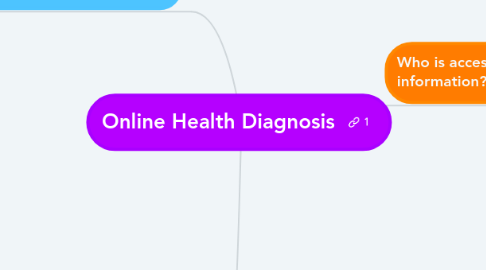
1. Cause for online self-diagnosis
1.1. Lack of available appointments with experts
1.1.1. Overcrowded waiting rooms at clinics
1.1.2. Lack of experts
1.1.2.1. Why is there a lack of experts?
1.1.3. Patients are left to attend hospital ER with health issue
1.1.3.1. Clogging up hospital waiting rooms
1.2. Clinicians not being thorough enough with every client due to number of patients per day
1.2.1. No follow up procedure with clients to ensure they have been treated effectively
1.3. Affordability of appointments
1.3.1. Medicare Rebate not sufficient
1.3.1.1. Patients left without assistance
1.3.1.1.1. Further sickness?
1.4. Patients genuinely not wanting to see a specialist
1.4.1. Lack of rapport/ support from clinician
1.4.1.1. Patient's inability to openly discuss their medical issues with clinician
1.5. Waiting room times
1.5.1. Limited time available for a doctor appointment and always left waiting longer than originally expected
1.6. People unable to leave uni/ work for a doctors appointment
1.7. Previous bad experiences with clinicians
1.7.1. Resentment/ pride resulting in patient categorising all specialists under the one impression?
2. Detriment of online self-diagnosis
2.1. No confirmation or tests carried out to verify any illness
2.1.1. Sickness is never really identified
2.2. Cyberchondria
2.2.1. Anxiety caused by self-diagnosis
2.2.1.1. Lead to further health issues
2.3. Mistreatment of sickness
2.3.1. Waste of further money on drugs that will not help
2.3.1.1. Damage caused from taking incorrect medicine
2.4. The possibility that the information online is not correct
2.4.1. Uninformed patients potentially providing incorrect advice to others with same symptoms of illness
2.4.1.1. Further people becoming sick
2.5. Infection of others if contagious
2.6. Local practices suffer from lack of patients
2.6.1. Charges increasing to make up for missing number of patients
2.6.1.1. Health care then becomes even less affordable
2.7. Patients may stop going for regular check ups e.g. prostate/ breast exam
2.7.1. Increase in serious health issues that could be preventable
2.7.1.1. Loss of more lives?
3. Who is accessing online information?
3.1. Adolescents/ school students
3.1.1. Embarrassed to talk about health issues openly?
3.1.1.1. Are they mentally able to make such informed choices at such a young age?
3.2. Females
3.2.1. In general appear to be willing to address a health issue immediately
3.2.2. Mothers
3.2.2.1. Questions about their baby that they want to know the answer of immediately
3.2.2.1.1. Easier to access information online than it is to take a sick child to a doctor
3.3. Existing sufferers
3.3.1. People looking for online support groups and answers to questions they haven't been told yet
3.3.1.1. Could be making emotional decisions based on opinions received from online support groups
3.4. Males
3.4.1. Too busy or unwilling to physically go in and see a clinician - "She'll be right' attitude
3.5. Young Adults
3.5.1. People with easy access to the internet at work/ uni
3.5.1.1. Due to their work/uni commitments unable to go and physically see a clinician
